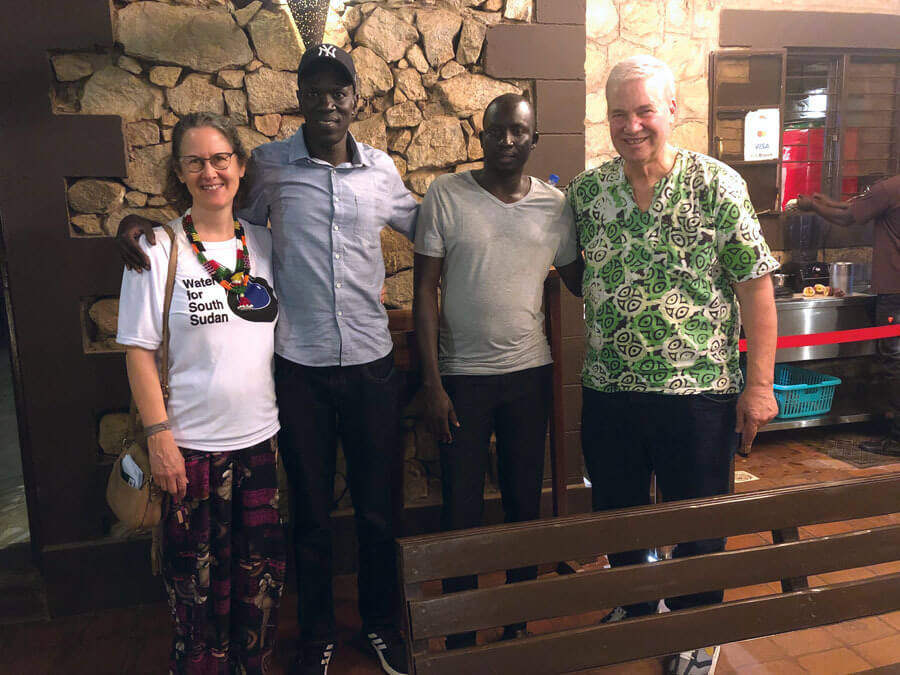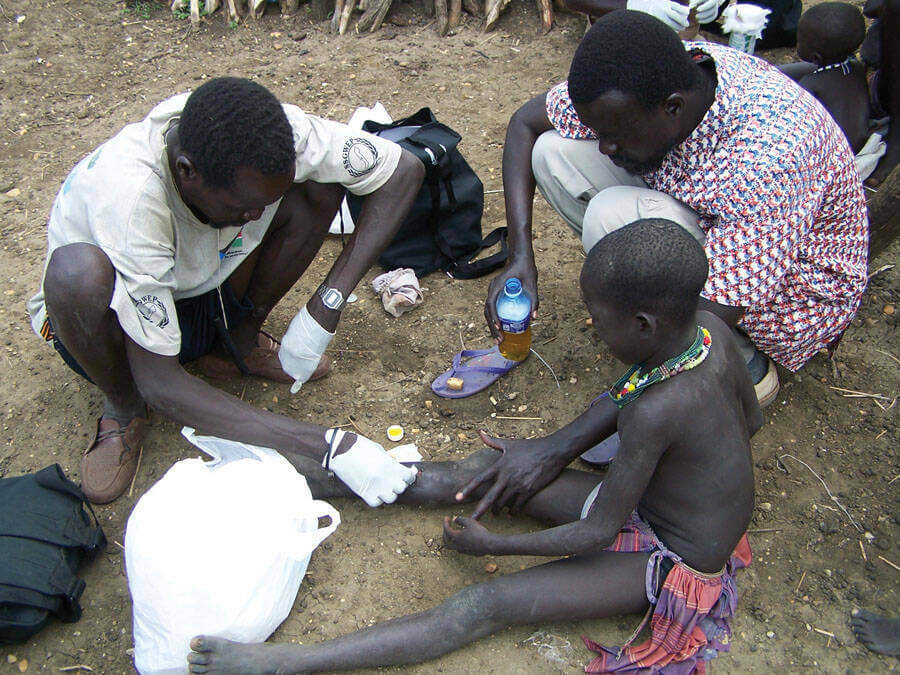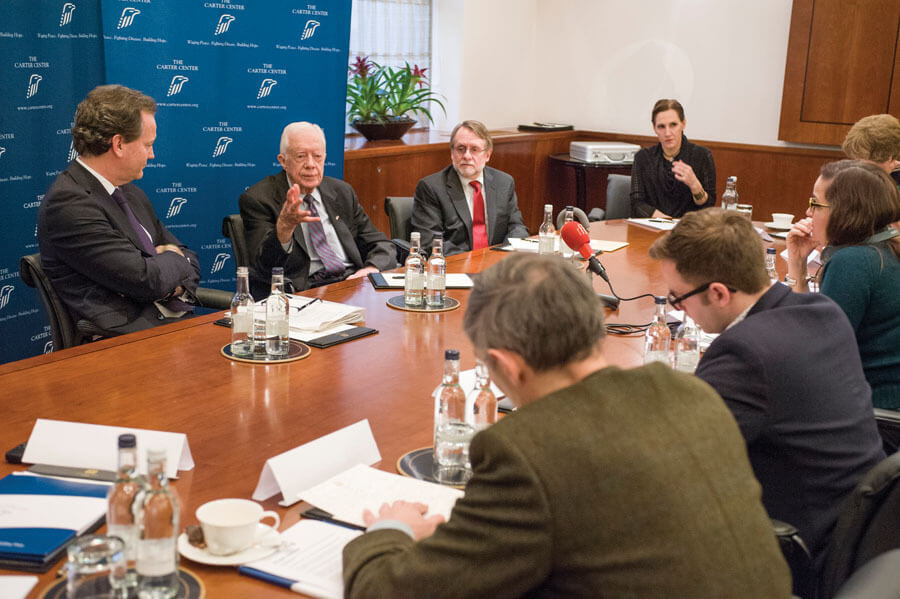A Guinea worm egg ingested from contaminated drinking water hatches in a person’s intestine and develops for a year inside the body. The worm, thin and sinuous like cooked spaghetti, may grow nearly a meter long before it’s ready to lay its own eggs. Then it emerges, several agonizing millimeters a day for two to three months, from livid sores in the infected person’s leg or foot.
The burning sensation is so intense that victims often seek relief in the same stagnant ponds that serve as water sources in those impoverished South Sudanese communities where the world’s few remaining cases of Guinea worm disease still appear. Larvae from exiting worms repollute the water, people drink unaware of the risk, and the cycle continues.
More than half of a community might be stricken with Guinea worm at the peak of its prevalence during the planting and harvesting seasons, devastating the capacity to reap and sow. The unrelenting, debilitating pain keeps infected children out of school for weeks or months at a time, extended absences that may recur year after year through multiple infections.
Also known by the Latin name dracunculiasis, or “little dragon disease” this plague has persisted for millennia. “There’s a thought,” says Jim Niquette ’76, one of the pathology’s chief modern antagonists, “that the fiery serpent referred to in the Bible is a Guinea worm.”
As The Carter Center’s country director for South Sudan, Niquette’s job is to drive out the serpent. He’s joined in that endeavor by two other Notre Dame alumni, Craig Withers ’76 and Lynn Malooly ’84. They share a commitment to implementing what’s known as WASH, shorthand for the standards of water, sanitation and hygiene required to improve health and reduce poverty in the developing world.
Their winding paths through life have intersected in one of the most challenging environments on Earth. Each oversees essential resources in the mission to root out waterborne disease by implementing the WASH strategy among people in dire need.

South Sudan is on the cusp of eliminating Guinea worm disease — the world’s only 15 cases were documented there in 2021. Achieving that milestone would complete the goal of global eradication that former U.S. President Jimmy Carter established for his humanitarian institute more than three decades ago.
In 1986 some 3.5 million people suffered Guinea worm infections. Categorized as a “neglected tropical disease,” it afflicted people in 20 African and Asian nations. It’s now gone from all but one, with The Carter Center having spearheaded previous eradication efforts in Angola, Chad, Ethiopia, Mali and Ghana.
Withers, the Atlanta-based center’s vice president of overseas operations who manages programs in 17 countries, has been instrumental in rooting out the parasitic infection since the 1980s. The public health expert also has contributed to other large-scale disease treatment and prevention initiatives, such as directing purchase and delivery of mosquito nets to fight malaria in Ethiopia.
In 1988, when Withers embarked on the task of fighting Guinea worm disease in Nigeria, he heard doubts that eradication could be accomplished. Even incremental progress, he learned, requires tenacity — and a willful ignorance of the many impediments that favor failure. He takes inspiration from bumblebees. They’re not designed to fly, he has said, “but they don’t know that, and so they fly.”
Withers and Niquette knew each other as residents in Dillon Hall. They reconnected in 2002 when Niquette, after a 20-year career in the technology business, set out to fulfill a long-held ambition to return to Africa, where he had served in the Peace Corps. Circumstances had forced his hasty exit from Liberia in the late 1970s with a couple months remaining on his two-year commitment.
Niquette’s Liberian counterpart in the government ministry where he worked faced a treason trial for alleged involvement in protests that led to rioting. Niquette knew nothing about it, but authorities suspected him of having valuable information. During a trip he took with Niquette to buy equipment in the United States, the defendant had reportedly met with other accused conspirators who lived in Boston and Washington, D.C., at the time.
“Not a very inviting set of circumstances,” Niquette says.
He spoke to Peace Corps officials, who agreed he should leave Liberia, but he needed an exit visa, adding bureaucracy to his anxiety. A reassuring ministry official told him not to worry about his friend’s fate — the trial would be for show, which turned out to be true — and helped him secure the necessary paperwork. Niquette flew out of the country that night.
‘There’s a thought that the fiery serpent referred to in the Bible is a Guinea worm.’
Back in the States he put his finance degree to work, but the call to Africa — and the importance to his soul of serving people in need — kept whispering in his ear. “It was, as far as I was concerned, a matter of time,” Niquette says. “I’m not going to show up for Judgment Day with other people, so if I think this is the best way to spend my life, that’s what I’m going to do.”
Looking for opportunities on The Carter Center’s website, he rediscovered Withers, who needed someone to lead projects in what was then the undivided nation of Sudan, a dangerous war zone. “I’m not sure if Craig felt sorry for me or nobody else applied for the job,” Niquette says. “Maybe it was both.”
After brief stints in Sudan and Nigeria, Niquette moved on to Ghana. His seven-year tenure as the center’s representative there ended in 2011 with the in-country eradication of Guinea worm disease. He stayed in Ghana for another decade running his own nongovernmental organization.
Late last year, Niquette again heard from Withers, who needed to fill a vacancy in South Sudan on short notice. It was to be a temporary appointment, but discussions soon shifted to a longer-term plan for Niquette to help ramp up the WASH strategy that had stamped out Guinea worm elsewhere. A $500,000 grant from The Carter Center seeds the struggle in South Sudan. “How could I say no to that?” Niquette says.
To make effective use of the funds, he had to hustle. The plan was to drill wells in communities where they would have the greatest impact, instruct local people to maintain and repair them, and provide the sanitation and hygiene education. All that had to be done before the six-month rainy season started in May 2022 — or whenever the heavens opened in the changing climate — washing out roads and making well-drilling impossible. Niquette’s staff had no time to source trucks and drills; partnership with an organization already equipped to do such heavy lifting was of the essence.
New to the country, Niquette didn’t know much about Water for South Sudan, a Rochester, New York-based nonprofit. Salva Dut, a former “Lost Boy” separated from his family at age 11 during the Sudanese civil war, spent a decade in refugee camps. After resettling with a family in Rochester, he discovered that his father was back in South Sudan, still alive but suffering from waterborne disease. Dut founded Water for South Sudan in 2003 to address the source of afflictions like his father’s.
Building wells to deliver clean water is the heart of the effort. When Niquette discovered that Lynn Malooly happens to be Water for South Sudan’s executive director, the “small world after all” coincidence of working with another Notre Dame alum cemented the obvious symbiosis between his priorities and hers.

Malooly may have followed the most unlikely path of the three alumni to this long-distance collaboration. A Program of Liberal Studies graduate, she spent years homeschooling her three children and worried about how to put her education to use after they were grown. As her oldest child prepared to graduate high school in 2010, Malooly put out what she calls “an intention-to-the-universe-slash-prayer” for a productive next act of her life. She sought something that would use her talents but be compatible with the homeschooling responsibilities she’d have for several more years. And she wanted whatever this unforeseen new opportunity would be to help mankind. “I’m not kidding,” Malooly says. “And I sort of sent that out.” A cold call to the cosmos.
Six months later the cosmos called back. A colleague from her pre-homeschooling days asked Malooly if she was looking for part-time work. “I literally said, ‘Yeah, how did you know?” Water for South Sudan, with offices about a mile and a half from her home, needed an administrator.
Over time, the nonprofit’s first American-born employee became its executive director. The organization puts the cost of installing a well at $15,000 — Notre Dame’s Class of 1984 sponsored one — with an additional $3,000 required for upkeep. Ferrying workers and equipment throughout 250,000 underdeveloped square miles, an area roughly the size of Texas, means surmounting immense logistical obstacles.
Beyond the capital of Juba, South Sudan’s infrastructure is poor-to-nonexistent. The world’s youngest nation has no reliable electricity or phone service and less than 200 miles of paved roads, with dirt paths that become impassable mud pits during the rainy season. Those circumstances help explain why just 41 percent of the population has access to safe, clean water — “access” defined as having a hand-pumped well within 500 meters of one’s home. Fewer still have toilets, making open defecation and its associated health dangers a fact of life for three-quarters of the population. Children suffer most. Malnutrition and dysentery have claimed many lives and stifled the development of entire generations.
Amid such poverty, violence also proliferates, exacerbated by the availability of weapons from the country’s two-decade civil war that ended in 2005. The research organization Humanitarian Outcomes classifies South Sudan as the most dangerous country for aid workers, who experienced 65 attacks in 2021 — more than twice the number as those in Afghanistan, the second-most hazardous. Niquette’s team includes a full-time monitor evaluating security conditions. Carter Center staff have an 8 p.m. curfew and move to new locations only after multiple approvals affirm that it’s safe.
“South Sudan is as tough as it gets,” he says.
Guinea worm is not the only endemic disease that contributes to the cascade of suffering among the South Sudanese. Trachoma, a bacterial infection that causes vision loss, is another target for The Carter Center, which funds medication and surgeries. Hygiene education — don’t touch your eyes, refrain from sharing towels or clothes — also stems the tide of trachoma.

Niquette offers an obvious solution to these insidious dangers: “Give them all toilets and give them all water pumps, and the whole problem will disappear,” but, short of a magic wand or a philanthropist’s gigantic blank check, those life-sustaining essentials remain beyond reach.
Instead, some 300 Carter Center workers, hired from and living in these far-flung communities, educate their neighbors about disease prevention and report suspected Guinea worm infections to the staff in Juba. The aim is to intervene and remove worms before victims go to a water source for relief.
Every intervention happens in consultation with local leaders and the national health ministry. New infections can appear anywhere, at any time, requiring vigilance before cases tick up to imperil a community anew. Isolated cases are unlikely in areas where many people drink from the same stagnant pond, so identifying and treating each infection becomes a cyclical, often-discouraging chase. “Because the country is so vast,” Niquette says, “you can’t put a person in every location.”
Further, an infection offers no immunity. Anyone who contracts Guinea worm disease is five times likelier to be reinfected the following year, which means that allowing even the few remaining cases to go untreated threatens a community’s ability to feed itself and educate its children, not just for that season but into the next year, and the next.
Determining where scarce resources will have the greatest impact demands knowledgeable partners like Water for South Sudan to evaluate such widespread need. At a remote drilling location during Malooly’s first visit to the country in 2018, two men on small motorcycles rode up and asked if the crew would “please, please, please” install a well in their village. “We had to say no,” she says. “We could’ve stopped every mile” to meet such requests.
Any progress also risks a setback if locals lack the knowledge to sustain it. Water quality requires skilled, permanent monitoring, and pumps need regular maintenance and inevitable repair. The Carter Center strives toward its own obsolescence. “We want to work ourselves out of a job,” Withers says, “and leave a legacy of trained people.”
Water for South Sudan has a similar objective. “Just putting in a well and walking away, that will help things for a little while,” Malooly says, “but eventually the well will break” and outside help to fix it will not be available. Infrastructure and education go hand in hand to make the WASH improvements viable for the long term.
The power of that approach has been demonstrated in the global progress against Guinea worm disease. A Carter Center video from March offers a poetic summation of the success so far, from the “endless and traceless” number of cases 40 years ago to today’s refrain — “It’s just 15!” — and a hopeful countdown to zero.
A countdown is apt because the challenges of reaching zero are comparable to preparing a rocket for launch. Complex, interrelated factors must align for the mission to succeed, many not within the partners’ control, but Niquette, Malooly and Withers exude an “all systems go” optimism about Guinea worm eradication.
“The program is close, it’s very, very close,” Withers says. “And if we can get water in to buttress some of the areas, along with the other interventions, we think we could probably close the deal in South Sudan.”
Jason Kelly is an associate editor of this magazine.